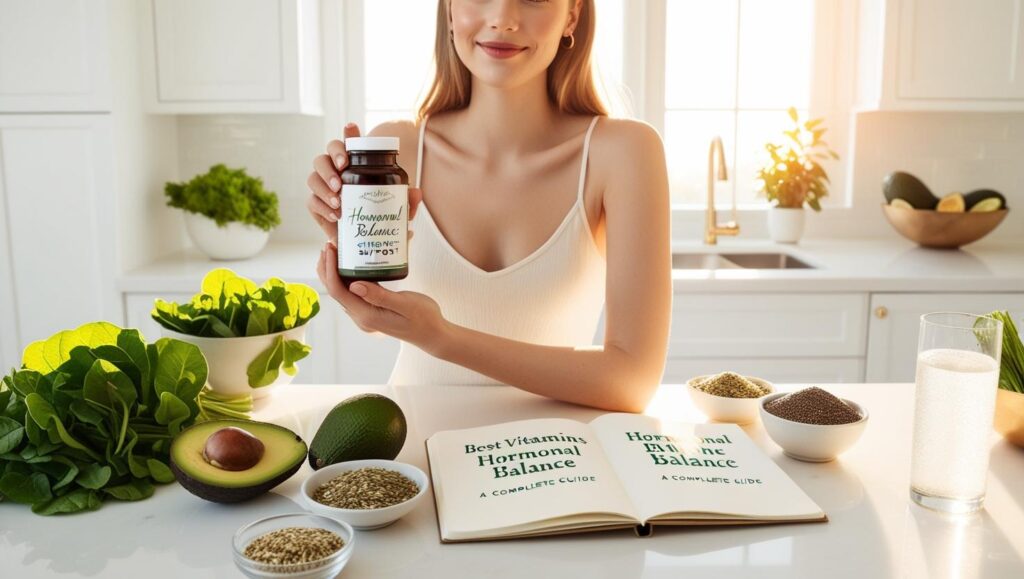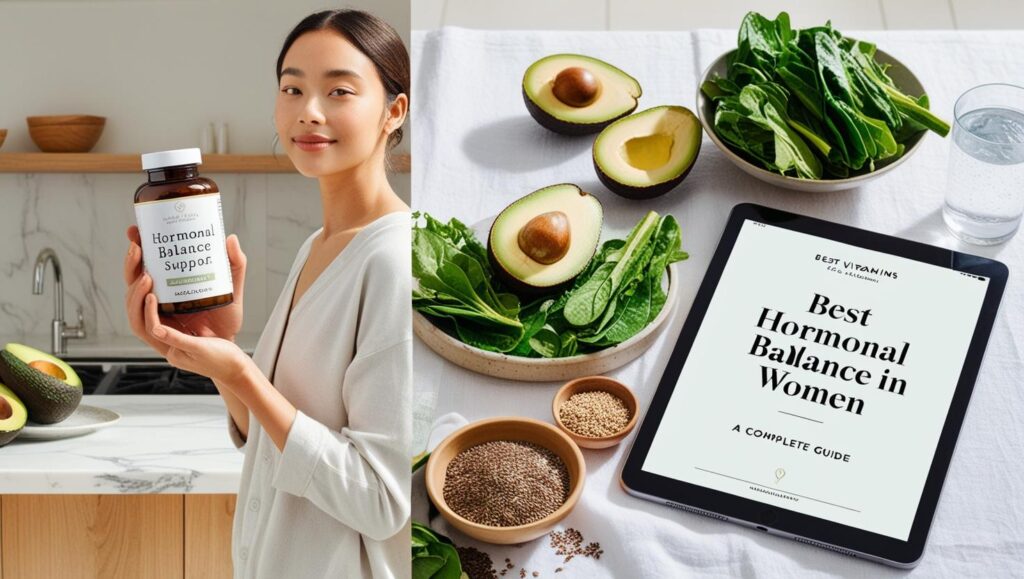Hormones are the body’s chemical messengers, regulating metabolism and mood, as well as reproductive function and sleep. For women, hormonal changes are an integral part of life—through puberty and menstruation, pregnancy and perimenopause, and into menopause and beyond. But when their balance is skewed, they become a source of a multitude of issues ranging from mood swings, fatigue, and irregular periods to weight gain, acne, and much more.
While lifestyle changes, diet, and exercise all play a role in supporting hormonal health, the right vitamins and nutrients can make a dramatic difference. This article explores the best vitamins for women’s hormonal balance, why they matter, and how to incorporate them into your daily routine for optimal well-being.
Why Hormonal Balance is Important for Women

Hormones like estrogen, progesterone, testosterone, cortisol, and insulin cooperate to regulate the body’s homeostasis. Even small imbalances result in a multitude of symptoms. For instance:
- Low estrogen levels may cause night sweats, mood swings, and vaginal dryness.
- Elevated cortisol levels are associated with weight gain, anxiety, and sleep disturbances.
- Insulin resistance is a cause of PCOS and a risk factor for type 2 diabetes.
Fortunately, there is good news: targeted supplements may support the glands and organs that produce and regulate the hormones.
Top Vitamins and Nutrients for Women’s Hormonal Balance
1. Vitamin D: The Sunshine Vitamin
Vitamin D is really a hormone rather than a vitamin, and is an important part of endocrine function. It regulates insulin and aids the ovaries and adrenal glands.
- Controls menstrual periods
- Supports mental stability and fights depression
- It improves insulin sensitivity (vital for PCOS and overall metabolism).
Sources:
- Solar light (15-30 minutes sun exposure a day)
- Greasy fish (salmon, mackerel)
- Fortified dairy and plant milk
- Supplements (Vitamin D3 is more bioavailable than D2)
Dosage: 1,000 to 4,000 IU daily, but it is optimal to monitor your levels by blood test.
2. Vitamin B6: PMS and Mood Support
Vitamin B6, a B-complex vitamin, is involved in neurotransmitter synthesis—namely, serotonin and dopamine—and is thus needed for emotional stability and premenstrual symptom control.
- Decreases PMS signs and symptoms of irritability and mood swings
- Helps regulate progesterone levels
- Supports energy metabolism
Sources:
- Poultry and fish
- Potatoes and starchy vegetables
- Non-citrus fruits
- Fortified cereals
Dosage: 50-100 mg per day is safe for most people, although long-term high intake should be supervised.
3. Vitamin E: The Fertility Booster
Vitamin E is a fat-soluble antioxidant that sustains healthy reproduction and shields the body against oxidative stress.
- Relieves PMS Symptoms
- Supports estrogen balance:
- Improves Egg Quality and Enhances Fertility
Sources:
- Nuts and seeds like almonds, sunflower seeds
- Spinach and broccoli
- Plant oils (sunflower, wheat germ)
Dosage: 15 mg (22.4 IU) per day; a dose of up to 400 IU is usually used for therapy under close supervision.
4. Vitamin B12: Energy and Thyroid Function
Vitamin B12 is crucial for the creation of red blood cells, DNA production, and maintaining healthy nerves. It is especially necessary for women with a thyroid condition or those who have a vegetarian or vegan diet.
- Supports thyroid hormone production
- Works against fatigue and brain fogginess
- Aids in hormone synthesis
Sources:
- Meat, eggs, and dairy products
- Nutritional yeast fortified
- Vitamins B12 supplements (use methylcobalamin)
Dosage: 250–500 mcg daily; higher dosages may be required for patients with impaired absorption.
5. Magnesium: The Relaxation Mineral

Quite simply, it’s referred to as the “calming mineral,” and it regulates cortisol levels, ensures restful sleep, and balances blood sugar—three pillars of hormonal wellness.
- Decreases PMS and cramping
- Reduces cortisol and induces relaxation
- Enhances insulin sensitivity
Sources:
- Dark leafy greens
- nuts and seeds
- whole grains
- Magnesium glycinate or citrate supplements
Dosage: 300 to 400 mg daily.
6. Small But Mighty: Zinc
Zinc is a trace element that is required for more than 300 body processes, including those that control hormones.
- Supports fertility and ovulation
- Controls menstrual periods
- Decreases PCOS and acne symptoms
Sources:
- Shellfish, particularly oysters
- Beef and poultry
- Legumes and nuts
Dosage: 8–15 mg/day for women; higher levels should be temporary only.
7. Omega-3 Fatty Acids: The Anti-Inflammatory Powerhouse
Not a vitamin itself, omega-3 fatty acids, particularly EPA and DHA, are necessary for decreasing inflammation and maintaining hormone receptor sensitivity.
- Balances estrogen and progesterone
- Supports brain and mood wellness
- Decreases menstrual pain and inflammation
Sources:
- Fatty fish (salmons, mackerel, sardines)
- Chia seeds and flaxseeds (ALA form)
- Algal-based supplements or fish oil
Dosage: 1,000-2,000 mg of total EPA and DHA
8. Iodine: Thyroid and Metabolic Wellness
Iodine is necessary for normal thyroid function, which is at the centre of hormonal control.
- Supports the production of T3 and T4 thyroid hormones
- Regulates metabolism and menstrual cycle
- Critical during pregnancy for fetal growth
Sources:
- Seaweed (kelp, nori)
- Iodized salt
- Dairy and fish
Dosage: 150 mcg a day; iodine excess may be harmful, so a healthcare practitioner should be consulted.
9. Iron: for Energy and Menstrual Health
Many women, particularly those who have heavy periods, are at risk for iron deficiency. Iron deficiency may compromise thyroid function and fertility and reduce energy overall.
- Prevents fatigue and mental fogginess
- Supports thyroid function
- Aids menstrual cycle regulation
Sources:
- Red meat
- Spinach and legumes
- Iron-fortified cereals
Dosage: 18 mg/day for premenopausal women. Check ferritin levels prior to supplementing.
Tips for Selecting the Right Supplements

- Choose bioavailable forms. Opt for the most bioavailable forms of vitamins—such as methylated B12 (methylcobalamin), magnesium glycinate, and Vitamin D3, for example.
- Look for filler and additive free supplements that do not contain artificial coloring, preservatives, or unneeded binders.
- Seek the guidance of a healthcare professional. Unless pregnant, nursing, or taking prescription medication, consult with a licensed healthcare practitioner before taking any new supplement.
Lifestyle and diet still count.
Supplements may be a key component, but they function most effectively while teamed with a healthy lifestyle:
- Consume a whole-food-based diet that is full of fiber, healthy fat, and lean protein.
- Exercise regularly to support insulin and cortisol balance.
- Prioritise sleep and stress management. Restrict endocrine disruptors such as BPA, phthalates, and excess caffeine or alcohol.
When to seek professional help
In case you feel that a hormonal imbalance—such as irregular periods, persistent fatigue, mood disorders, or unexplained weight gain—is occurring, it is always best to consult a medical professional. Both saliva and blood tests can identify deficiencies or imbalances and inform a tailored treatment protocol.
Final Thoughts
Hormonal balance is not only a matter of reproductive well-being—your mood, energy, metabolism, and even long-term disease risk are affected by it. Keeping your body supplied with the necessary vitamins and nutrients helps maintain optimal levels of hormones at each life stage. Whether one is dealing with PMS, menopause, or just general wellness, the proper supplements can make a difference. By adding these necessary vitamins to a complete wellness regime, anyone can take meaningful steps toward a healthier, balanced self. Ready to begin the hormone-balancing process? Start with a blood panel, analyze your diet, and add some high-quality supplements based on what you need.
![]()






